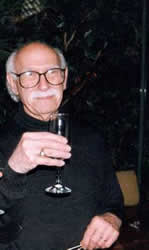

|

|
IN MEMORIAM
Marvin Weil, M.D.
Professor of Pediatrics, Emeritus
Los Angeles
1924 – 2005
Dr. Marvin Weil, professor emeritus in pediatrics, passed away unexpectedly at age 81 on Sunday, November 20, 2005 in Oxford, England where he had enjoyed retirement since 1989 with Joyce, his wife of 51 and a half years. He is also survived by three children: Daniel, Clifford, and Meredith, and four granddaughters. Dr Weil was chief of the Division of Pediatric Neurology from 1968 to 1989 at Harbor-UCLA Medical Center. He had a long and rich life with many friends and legions of trainees.
After graduating with High Honors from the University of Florida, receiving an M.D. from Johns Hopkins University in 1946, and starting pediatric residency at Duke University, his training was interrupted by service in the Army Medical Corps where he rose to the rank of captain and was assistant chief, Neurotropic Virus Section, Division of Virus and Rickettsial Diseases, Army Medical Department Research and Graduate School, Washington, D.C. He then moved to Cincinnati Children’s Hospital to complete pediatric training and subsequently became a clinical instructor at the University of Cincinnati where he was appointed the assistant director of the Contagious Pavilion at Cincinnati General Hospital. After two years in this position, he returned to Florida to become a general pediatrician in private practice in the Miami area and became clinical assistant professor of pediatrics at the University of Miami until 1965 when he began fellowship training in pediatric neurology, first at Johns Hopkins and then UCLA.
As a neurologist, Dr. Weil developed a research interest in chronic infections of the central nervous system, particularly subacute sclerosing panencephalitis (SSPE) due to measles virus and rubella virus panencephalitis. In 1976, he obtained a Fogarty Senior International Fellowship and spent a year on sabbatical at the Karolinska Institute in Stockholm perfecting the methodology for detecting antibodies and antigens in brain tissue and CSF. He was able to demonstrate with others that antibodies in the brain of patients with SSPE and in the cerebrospinal fluid of a patient with rubella panencephalitis were directed to measles or rubella antigens, respectively. His curriculum vitae includes many clinically important neurologic articles including a New England Journal of Medicine article in 1975 demonstrating that rubella virus could be cultured from the brain of a patient with rubella panencephalitis and that pathologically there were some similarities to SSPE.
Following his retirement in Oxford, England, he was very actively involved as an academic visitor at the University of Oxford, Department of Biochemistry, with a particular interest in brain imaging. He also continued to write definitive book chapters about infections of the central nervous system and participated in neurology rounds each Friday. His retirement allowed him to pursue his talent in portrait painting and he always walked two miles each day
The faculty, residents, and students at Harbor-UCLA remember Professor Weil most for his extraordinary enthusiasm and professionalism, his skill in teaching neurology, and the wonderful care he gave his patients.
Margaret A. Keller